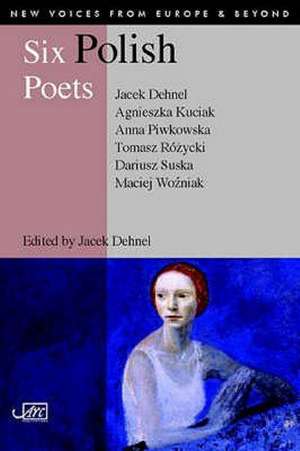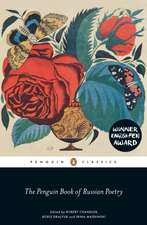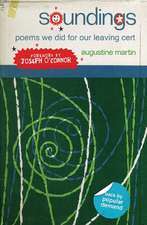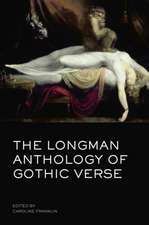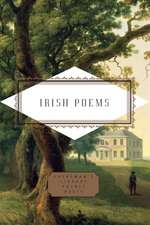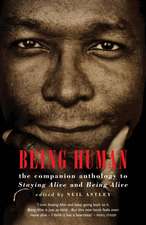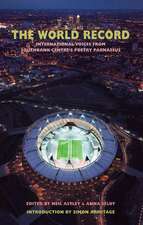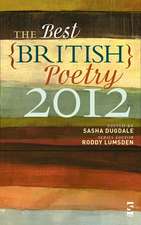Six Polish Poets: New Voices from Europe & Beyond
Editat de Jacek Dehnelen Limba Engleză Paperback – 31 mar 2009
Unlike the poets of the previous generation who, in the period of new-found freedom after the fall of communism, adopted a highly individualistic, anarchic, sometimes brutal style, the poets represented here re-examine and experiment with traditional poetic forms, themes and cultural references in poems that are refined and witty, moving and informed, ranging across every aspect of human existence.
This anthology is both thought-provoking and full of warmth and humanity, and while it cannot claim to be representative of contemporary Polish poetry as a whole, it nevertheless provides an insight into today's literary scene in Poland.
Parallel text: Polish / English
Preț: 98.54 lei
Nou
Puncte Express: 148
Preț estimativ în valută:
18.86€ • 19.74$ • 15.69£
18.86€ • 19.74$ • 15.69£
Carte disponibilă
Livrare economică 10-24 martie
Preluare comenzi: 021 569.72.76
Specificații
ISBN-13: 9781904614500
ISBN-10: 1904614507
Pagini: 170
Dimensiuni: 156 x 234 x 10 mm
Greutate: 0.28 kg
Ediția:New.
Editura: Arc Publications
Seria New Voices from Europe & Beyond
Locul publicării:United Kingdom
ISBN-10: 1904614507
Pagini: 170
Dimensiuni: 156 x 234 x 10 mm
Greutate: 0.28 kg
Ediția:New.
Editura: Arc Publications
Seria New Voices from Europe & Beyond
Locul publicării:United Kingdom
Recenzii
'Six Polish Poets' is the second bilingual anthology of Polish poetry, published by Arc. It is also the fifth volume in the series 'New Voices from Europe and Beyond' which brings contemporary world poetry to the English-language readers. The book features a selection of poets who made their debuts in the past two decades; mostly, however, in the 1990s or later. As Jacek Dehnel, the volume's editor and one of its contributors, rightly points out, the authors' common feature is re-examination and deconstruction of traditional poetic forms and themes. In the poems presented here, the metric and rhythmic structures undergo bold alterations, while the imagery and poetic voice become largely influenced by contemporary language. The anthology opens with a selection of poems by Anna Piwkowska, whose verse reveals a mature approach to questions of love and gender. What strikes the reader here, however, is the skilful use of traditional syllabic patterns, such as the thirteen-syllable line, which has been part of the Polish poetic tradition for centuries. With slight modifications, it appears in the poem 'A Train'. Together with the well-structured rhyming scheme, it turns the literary description of a train journey into a melodic and sensual flow of sounds. Even though one would expect those devices to be lost in translation, the exceptional rhythm and beauty of this poetry have not disappeared in the adept translations by Elzbieta Wojcik-Leese. In comparison to Piwkowska's verse, Dariusz Suska's texts can be situated at the far end of the thematic and linguistic spectrum. The exploration of death intertwines in his oeuvre with childhood memories, while the persona often wears at once the masks of an adult and a child. The presented poems reveal, above all, Suska's extraordinary quality in capturing the very essence of the Polish reality, its objects, conventional gestures and odd habits. It is enough to mention the images of the popular in the 1980s Wigry folding bicycles in the poem 'Go Down to the Cellar - ' or the Christmas Eve carp swimming in a bathtub, as presented in 'By the Twentieth...'. Mira Rosenthal's masterly translations of Tomasz Rozycki's verse comprise the third part of the anthology. Both, the poet's affinity with the form of the sonnet and his attachment to problems of history, identity, belonging and love are recognizable in the presented selection. Although unique and personal, his poems have a universal appeal which makes them equally valid both for Polish and English-language readers. Maciej Wozniak's poetry is almost entirely immersed in the world of music. It is not only the inspiration but also the rationale for Wozniak's oeuvre. Even love poems, such as 'Three Pieces for Two Voices and Lute', turn into musical explorations. In this particular text, John Dowland's songs serve as a stimulus to examine problems of love and its gradual fading. It is the skilful construction of the persona that strikes the reader in the selection of Agnieszka Kuciak's poems. Far from being fixed, the speaker seems to personify the contemporary human identity. Its main characteristics are movement, change and fluidity. These are also the elements that make Kuciak's poetry versatile, imaginative and inspiring. The anthology closes with works by Jacek Dehnel, the youngest poet in the volume and one of the most accomplished writers of his generation. The translations from Polish, by Antonia Lloyd-Jones and George Szirtes, fully convey Dehnel's passion for language and indicate the poetic influences that have shaped his work. Dehnel's texts are well grounded both in Polish and European literary tradition. Poems worth mentioning include 'Happiness' and 'Symmetry', both reminiscent of works by Philip Larkin - a poet that Dehnel has studied closely and translated into Polish. Overall, Six Polish Poets is an enjoyable and thought-provoking read which will surely appeal to a wide audience. The volume will be welcomed not only by students of Polish literature, but also by lovers of poetry seeking a first-rate reading experience. And last but not least, the book will be a valuable addition to the body of world literature in English. Ewa Stanczyk in 'The Review' (Manchester) 20 January 2009
Notă biografică
ANNA PIWKOWSKA, born in 1963, is a poet, essayist and critic who studied Polish philology at Warsaw University. She has published seven volumes of poetry: 'Szkicownik' (Sketchpad, 1989), 'Cien na A cianie' (Shadow on the Wall, 1990), 'Wiersze i sonety' (Poems and Sonnets, 1992), 'Skaza' (Flaw, 1996), 'Tylko trzy drogi' (Only Three Roads, 2000), PO (2002), and a selection, 'Niebieski sweter' (Blue Sweater, 2004). In 2003 her book about the Russian poet Anna Akhmatova, 'Achmatowa czyli kobieta' (Akhmatova Alias Woman), appeared and in 2007 'Slad lyzwy' (Skate Tracks), based on true stories from the life of Austrian poet Georg Trakl, was published. Her poems have appeared in many leading Polish literary journals and have been translated into Russian, German and Slovene. She has also written song lyrics, the words for the Prologue to an eighteenth-century opera by Maciej Kamienski, 'Nedza uszczesliwiona' (Misery Made Happy), and poetry for Barbara Sass's film 'Jak narkotyk' (Like a Narcotic, 1999). She is an expert on the Russian Acmeist poets, especially Anna Akhmatova, in whose footsteps she has travelled in Russia and Ukraine to research her book. She has won several literary prizes including the Georg Trakl Award (1995), a Koscielski Foundation Distinction (2002) and the Warsaw Literary Premiere Award (2003). DARIUSZ SUSKA was born in 1968 in Zlotoryja, ninety kilometres west of Wroclaw. He studied experimental physics at the universities of Wroclaw and Warsaw, and information technology as a post-graduate, but has not taken up either professionally. He has published several books of poetry, of which 'Wszyscy nasi drodzy zakopani' (All Our Dear Ones Buried, 2000) won an award from the Polish Society of Book Publishers and was nominated for the Nike Award. Another collection, 'Cala w piachu' (Covered in Sand, 2004) was on the Nike shortlist. His most recent book, 'Czysta ziemia' (Pure Earth), appeared in February 2008. He lives in Warsaw with his wife Aneta, who is the author of a book about Japanese cinema, and their five-year-old daughter Natasza. TOMASZ ROZUCKI, born in 1970, is a poet and translator. He lives in Opole. His published volumes of poetry are: 'Vaterland' (1997), 'Anima' (1999), 'Chata umaita' (Country Cottage, 2001), 'Swiat i Antyswiat' (World and Antiworld, 2003), 'Kolonie' (Colonies, 2006), and the epic poem 'Dwanascie stacji' (Twelve Stations, 2004). His work has appeared in many periodicals and anthologies in Poland and abroad. He has won literary prizes including the K. K. Baczynski Award (1997), the Czas Kultury Prize (1997) and the Rainer Maria Rilke Award (1998). 'Dwanascie stacji' won a prize for the best Book of the Spring 2004, awarded by the Raczynski Library in Poznan, and 'Swiat i Antyswiat' was acclaimed the Best Poetry Book of 2003 in an internet poll run by Forum Krytyki Literatorium. Rozycki has been nominated for the Paszport Polityki (2004) and for Poland's top literary prize, the Nike Award (2005 and 2007). He won the Koscielski Foundation Prize (2004), and the literary journal 'Zeszyty Literackie"s Joseph Brodsky Award (2006). MACIEJ WOZNIAK, born in 1969, is a poet and music critic. His poetry books are: 'Srebrny olowek' (Silver Pencil, 1998), 'Illuminacje. Zacmienia. Szarosc' (Illuminations - Eclipses - Greyness, 2000), 'Obie strony A wiatla' (Both Sides of the Light, 2003), 'Wszystko jest cudze' (Everything belongs to Someone Else, 2005) and 'Iluzjon' (2008). He has also published reviews, columns and essays on music in journals including 'Tygodnik Powszechny' and the literary periodical 'Studium'. He lives in Plock. AGNISZKA KUCIAK, born in 1970, is a writer and translator of Italian literature. Her published collections of poetry are: 'Retardacja' (Retardation, 2001), hailed by the critics as the best debut of the 1990s, and 'Dalekie kraje. Antologia poetow nieistniejacych' (Distant Countries - An Anthology of Non-Existent Poets, 2005), about how young people in Poland feel disoriented. She has also published a set of original fantasy stories called 'Animula Blandula' (2007), a children's book called 'Przygody Kota Murmurando' (The Adventures of Murmurando the Cat, 2006) and some highly acclaimed translations, including Dante's Divine Comedy (2002-2004) and Petrarch's Sonnets (2002). She won the Feniks Award for her translation of Dante's Inferno and Purgatorio, the Publishers' Association Award for 'Retardacja' and the Polish President's Prize for her book 'Dante Romantykow' (The Romantics' Dante). She is now working on an anthology of Italian love sonnets to be called 'Dawne plomienie' (Old Flames). She is employed at the Adam Mickiewicz University in Poznan. JACEK DEHNEL, was born in Gdansk in 1980. He graduated in Polish studies at Warsaw University and lives in Warsaw's Powisle district. He has published four volumes of poetry: 'Zywoty rownolegle' (Parallel Lives, 2004); 'Wyprawa na poludnie' (Journey South, 2005); 'Wiersze' (Poems), a collection including the two earlier volumes and the previously unpublished 'Pochwala przemijania', (In Praise of Passing, 2006); and 'Brzytwa okamgnienia' (A Razor-sharp Glance, 2007). He has also published two books of short stories, 'Kolekcja' (The Collection, 1999) and 'Rynek w Smyrnie' (The Marketplace at Smyrna, 2007), a novel, 'Lala' (2006) and a collection of four short novels 'Balzakiana' (2008). His work has appeared in many literary periodicals and he writes a review column for the 'Wirtualna Polska' (Virtual Poland) website. He has translated verse by poets including Philip Larkin, W. H. Auden, Osip Mandelstam, George Szirtes and Karlis Verdins, as well as song lyrics. He has won many major literary prizes in Poland, including the Koscielski Foundation Prize (2005) and the Paszport Polityki (2006, for 'Lala'). His poetry has been translated into English, Basque, French, Gaelic, Lithuanian, Slovak and Slovene. 'Lala' has been published in German translation and is due to appear in Israeli, Croatian, Italian, Slovak and Hungarian editions. He is also a painter and draughtsman.
Cuprins
Series Editor's Preface. Introduction. ANNA PIWKOWSKA (translated by Elzbieta Wojcik-Leese, Ewa Chrusciel & Karen Kovacik) Biography. Piosenka / A Song, Kwiat sie rozpada / Flowers Degrade, Gobelin / Tapestry, Rosja / Russia, Tren tamtego lata / Lament of That Summer, Don Juan / Don Juan, Rzeka Moskwa / The Moscow River Po prostu / For No Reason, W pogodny dzien / On a Sunny Day, Ostatnie lato / The Last Summer, Pociag / A Train, Co przynosza mezczyzni / What Do Men Bring?, Za oknem / Outside the Window, Dziewczyna w kordonkowej czapeczce / Young Woman in a Silk Cap. DARIUSZ SUSKA (translated by Bill Johnston) Biography. Wszystkie nory swiata, wiec i ten tu pokoj / All the Hovels in the World, and So This Room as Well, Uchylic balkon, w pokoj wwlec buczenie / Crack Open the Balcony Door, Drag into the Room the Insistent, Piec dni przelezal, zanim wytaszczyli / Five Days he Lay there Before they Hauled, Zejsc do piwnicy, poswiecic latarka / Go Down to the Cellar, Shine the Flashlight Beam W Wilkowie trzeba bylo wysiasc z pekaesu / In Wilkowo You Had to Get off the Bus, W ubranku do komunii zostal zakopany / He was Buried with his Little Communion Suit On, Fragmenty z roku 2003 / Fragments from 2003, Nie gniec jej bucikiem, oszczedzmy te ose / Don't Crush it with Your Shoe, Let's Leave the Wasp Alone, Szczesliwy dzien, w ktorym do gniazda szerszeni / It Was a Happy Day when Kojak Threw a Bomb, Pamietny dzien, w ktorym na tamto mrowisko / It Was a Memorable Day when a Punishment from Heaven, Zbieracz chrzaszczy / The Beetle Collector, Kopara im opadla, kiedy uderzylem / When I Took the Free Kick their Jaws Hit the Floor, Kolo dwudziestego plywaly juz w wannie juz w wannie / By the Twentieth They were Already in the Bath, Nazywalem to zyciem, a zycia nie bylo / I Called It Life, but there Was no Life. TOMASZ ROZICKI (translated by Mira Rosenthal) Biography. Przeprawa / A Crossing, Zolta nuta / Yellow Overtone, Antypody / Antipodes, Zajaczki / Bunny Rabbits, Piesn druga (Bibop) / Second Song (Bebop), Druga elegia na koniec zimy / Second Elegy at the End of Winter, Piesn dwudziesta pierwsza / Twenty-First Song, Kampania zimowa 2003 / Winter Campaign 2003, Zaglowce Jej Krolewskiej Mosci / Her Majesty's Fleet, Zywy towar / Fresh Meat Mrowki i rekiny / Ants and Sharks, Dryfowanie / Drifting, Koralowa zatoka / Coral Bay, Polow w zatoce / Fishing in the Bay, Dom gubernatora / The Governor's Residence. MACIEJ WOZNIAK (translated by Elzbieta Wojcik-Leese) Biography. Nowy Jork, czerwiec 1955 / New York, June 1955, Londyn, listopad 1936 / London, November 1936, Francois Couperin daje trzy Lekcje Ciemnosci / Francois Couperin Gives Three Lessons on Darkness Trzy utwory na dwa glosy i lutnie / Three Pieces for Two Voices and Lute, Kolyska / A Cradle, Klepsydra / Hour-glass, Kiedy umre, bedziesz mi sie snila / When I Die, You Will Visit My Dreams, Wiersz, ktory pomyslala sobie Virginia Woolf... / A Poem Which Occurred to Virginia Wolf..., Biedna Klara Schumann / Poor Clara Schumann, Zakret Wisly / Bend in the Vistula, Kwiecien, chlod rano / April, Cold in the Morning, Proboszczewice / Proboszczewice, Sukienka / The Dress, Glod / Hunger. AGNISZKA KUCIAK (translated by Ewa Chrusciel, Craig Greenman, Karen Kovacik & Ryszard Reisner) Biography. Metrum / Metre, Mieso / Meat, Wroniecka / Wroniecka, Pokoj / A Room, "Do kazdej rzeczy..." / "The rain knocks...", "Ta, ktora szyc nie chciala..." / "She who didn't want to sew...", "Przez roztargnienie..." / "And to drop...", Depresja / Depression, Czekajac na blondynki / Waiting for the Blondes, Romans / Romance, "Naga, otwarla mi..." / "Naked, she let me in...", W Rzymie / In Rome, Przyjazd do Bizancjum / Arrival at Byzantium, Niniwa / Nineveh. JACEK DEHNEL (translated by Antonia Lloyd-Jones) Biography. Szczescie / Happiness, Symetria / Symmetry, Smierc Wilde'a / The Death of Oscar Wilde, Saint-Malo / Saint-Malo, Biedny chrzescijanin patrzy na gabinet Peggy Sage / A poor Christian looks at the Peggy Sage salon, Miasta dalekie / Distant Cities, Brzytwa okamgnienia / A Razor-sharp Glance, Foto-Film, A. Cechnowski... / Foto-Film, A. Cechnowski..., Andy Warhol, "Robert Mapplethorpe"... / Andy Warhol, "Robert Mapplethorpe"..., Roza jest rozyczka jest paczkiem / Rose is a little Rose is a Rosebud, Big Splash / Big Splash, Zegar czyli... / The Clock or..., Przyjecie / The Reception. About the translators
